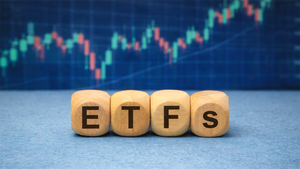First Trust Advisors L.P. ("FTA") announces the declaration of the Monthly distribution for certain exchange-traded funds advised by FTA, a series of First Trust Exchange-Traded Fund.
The following dates apply to today's distribution declaration:
Expected Ex-Dividend Date: |
January 2, 2024 |
Record Date: |
January 3, 2024 |
Payable Date: |
January 4, 2024 |
Ticker |
Exchange |
Fund Name |
Frequency |
Ordinary
|
|
||||
ACTIVELY MANAGED EXCHANGE-TRADED FUNDS |
||||
|
||||
First Trust Exchange-Traded Fund |
||||
IGLD |
Cboe BZX |
FT Cboe Vest Gold Strategy Target Income ETF ® |
Monthly |
$0.1339 |
|
||||
First Trust Exchange-Traded Fund VIII |
||||
XISE |
Cboe BZX |
FT Cboe Vest U.S. Equity Buffer & Premium Income ETF - September |
Monthly |
$0.1840 |
|
|
|
|
|
First Trust Advisors L.P. ("FTA") is a federally registered investment advisor and serves as the Fund's investment advisor. FTA and its affiliate First Trust Portfolios L.P. ("FTP"), a FINRA registered broker-dealer, are privately-held companies that provide a variety of investment services. FTA has collective assets under management or supervision of approximately $201 billion as of November 30, 2023 through unit investment trusts, exchange-traded funds, closed-end funds, mutual funds and separate managed accounts. FTA is the supervisor of the First Trust unit investment trusts, while FTP is the sponsor. FTP is also a distributor of mutual fund shares and exchange-traded fund creation units. FTA and FTP are based in Wheaton, Illinois.
You should consider the investment objectives, risks, charges and expenses of the Fund before investing. The prospectus for the Fund contains this and other important information and is available free of charge by calling toll-free at 1-800-621-1675 or visiting www.ftportfolios.com. The prospectus should be read carefully before investing.
Principal Risk Factors: You could lose money by investing in a fund. An investment in a fund is not a deposit of a bank and is not insured or guaranteed. There can be no assurance that a fund's objective(s) will be achieved. Investors buying or selling shares on the secondary market may incur customary brokerage commissions. Please refer to each fund's prospectus and Statement of Additional Information for additional details on a fund's risks. The order of the below risk factors does not indicate the significance of any particular risk factor.
There can be no assurance that an active trading market for fund shares will develop or be maintained.
A fund that uses FLEX Options to employ a "target outcome strategy" has characteristics unlike many other traditional investment products and may not be appropriate for all investors. There can be no guarantee that a target outcome fund will be successful in its strategy to buffer against losses. A shareholder may lose their entire investment. In the event an investor purchases shares after the first day of the target outcome period defined in the fund's prospectus ("Target Outcome Period") or sells shares prior to the end of the Target Outcome Period, the buffer that a fund seeks to provide may not be available.
A fund that effects all or a portion of its creations and redemptions for cash rather than in-kind may be less tax-efficient.
Commodity prices can have significant volatility, and exposure to commodities can cause the value of a fund's shares to decline or fluctuate in a rapid and unpredictable manner.
A fund may be subject to the risk that a counterparty will not fulfill its obligations which may result in significant financial loss to a fund.
The writer of a covered call option foregoes any profit from increases in the market value of the underlying security covering the call option above the sum of the premium and the strike price of the call, but retains the risk of loss if the underlying security declines in value. The Fund will have no control over the exercise of the option by the option holder and may lose the benefit from any capital appreciation on the underlying security.
Current market conditions risk is the risk that a particular investment, or shares of the fund in general, may fall in value due to current market conditions. As a means to fight inflation, the Federal Reserve and certain foreign central banks have raised interest rates and expect to continue to do so, and the Federal Reserve has announced that it intends to reverse previously implemented quantitative easing. Recent and potential future bank failures could result in disruption to the broader banking industry or markets generally and reduce confidence in financial institutions and the economy as a whole, which may also heighten market volatility and reduce liquidity. Ongoing armed conflicts between Russia and Ukraine in Europe and among Israel, Hamas and other militant groups in the Middle East, have caused and could continue to cause significant market disruptions and volatility within the markets in Russia, Europe, the Middle East and the United States. The hostilities and sanctions resulting from those hostilities have and could continue to have a significant impact on certain fund investments as well as fund performance and liquidity. The COVID-19 global pandemic, or any future public health crisis, and the ensuing policies enacted by governments and central banks have caused and may continue to cause significant volatility and uncertainty in global financial markets, negatively impacting global growth prospects.
A fund is susceptible to operational risks through breaches in cyber security. Such events could cause a fund to incur regulatory penalties, reputational damage, additional compliance costs associated with corrective measures and/or financial loss.
Investments in debt securities subject the holder to the credit risk of the issuer and the value of debt securities will generally change inversely with changes in interest rates. In addition, debt securities generally do not trade on a securities exchange making them less liquid and more difficult to value.
The use of derivatives instruments involves different and possibly greater risks than investing directly in securities including counterparty risk, valuation risk, volatility risk, and liquidity risk. Further, losses because of adverse movements in the price or value of the underlying asset, index or rate may be magnified by certain features of the derivatives.
A fund normally pays its income as distributions and therefore, a fund may be required to reduce its distributions if it has insufficient income. Additionally at times, a fund may need to sell securities when it would not otherwise do so and could cause distributions from that sale to constitute return of capital. Because of this, a fund may not be an appropriate investment for investors who do not want their principal investment in a fund to decrease over time or who do not wish to receive return of capital in a given period.
Trading FLEX Options involves risks different from, or possibly greater than, the risks associated with investing directly in securities. A fund may experience substantial downside from specific FLEX Option positions and certain FLEX Option positions may expire worthless. There can be no guarantee that a liquid secondary trading market will exist for the FLEX Options and FLEX options may be less liquid than exchange-traded options.
FLEX Options are subject to correlation risk and a FLEX Option's value may be highly volatile, and may fluctuate substantially during a short period of time. FLEX Options will be exercisable at the strike price only on their expiration date. Prior to the expiration date, the value of the FLEX Options will be determined based upon market quotations or other recognized pricing methods. In the absence of readily available market quotations for fund holdings, a fund's advisor may determine the fair value of the holding, which requires the advisor's judgement and is subject to the risk of mispricing or improper valuation.
A fund's income may decline when interest rates fall or if there are defaults in its portfolio.
In the event an investor purchased fund shares after the first day of a Target Outcome Period and the fund has already distributed a significant amount of the targeted income for the Target Outcome Period, there may be little or no ability for that investor to experience an investment gain on their fund shares, however, the investor will remain vulnerable to downside risks. Because the value of, and interest received from, the U.S. Treasury securities held by the fund may fluctuate and decrease over the Target Outcome Period, the fund may not be able to meet the targeted income level.
Depending on market conditions, the fund's income level may rise or fall from one Target Outcome Period to the next and is unlikely to remain the same for consecutive Target Outcome Periods.
A fund may be a constituent of one or more indices or models which could greatly affect a fund's trading activity, size and volatility.
As inflation increases, the present value of a fund's assets and distributions may decline.
Interest rate risk is the risk that the value of the debt securities in a fund's portfolio will decline because of rising interest rates. Interest rate risk is generally lower for shorter term debt securities and higher for longer-term debt securities.
Leverage may result in losses that exceed the amount originally invested and may accelerate the rates of losses. Leverage tends to magnify, sometimes significantly, the effect of any increase or decrease in a fund's exposure to an asset or class of assets and may cause the value of a fund's shares to be volatile and sensitive to market swings.
Certain fund investments may be subject to restrictions on resale, trade over-the-counter or in limited volume, or lack an active trading market. Illiquid securities may trade at a discount and may be subject to wide fluctuations in market value.
Information technology companies are subject to certain risks, including rapidly changing technologies, short product life cycles, fierce competition, aggressive pricing and reduced profit margins, loss of patent, copyright and trademark protections, cyclical market patterns, evolving industry standards and regulation and frequent new product introductions.
Large capitalization companies may grow at a slower rate than the overall market.
The portfolio managers of an actively managed portfolio will apply investment techniques and risk analyses that may not have the desired result.
Market risk is the risk that a particular security, or shares of a fund in general may fall in value. Securities are subject to market fluctuations caused by such factors as general economic conditions, political events, regulatory or market developments, changes in interest rates and perceived trends in securities prices. Shares of a fund could decline in value or underperform other investments as a result. In addition, local, regional or global events such as war, acts of terrorism, spread of infectious disease or other public health issues, recessions, natural disasters or other events could have significant negative impact on a fund.
Large inflows and outflows may impact a new fund's market exposure for limited periods of time.
A fund classified as "non-diversified" may invest a relatively high percentage of its assets in a limited number of issuers. As a result, a fund may be more susceptible to a single adverse economic or regulatory occurrence affecting one or more of these issuers, experience increased volatility and be highly concentrated in certain issuers.
A fund and a fund's advisor may seek to reduce various operational risks through controls and procedures, but it is not possible to completely protect against such risks. The fund also relies on third parties for a range of services, including custody, and any delay or failure related to those services may affect the fund's ability to meet its objective.
The prices of options are volatile and the effective use of options depends on a fund's ability to terminate option positions at times deemed desirable to do so. There is no assurance that a fund will be able to effect closing transactions at any particular time or at an acceptable price.
The market price of a fund's shares will generally fluctuate in accordance with changes in the fund's net asset value ("NAV") as well as the relative supply of and demand for shares on the exchange, and a fund's investment advisor cannot predict whether shares will trade below, at or above their NAV.
A fund with significant exposure to a single asset class, country, region, industry, or sector may be more affected by an adverse economic or political development than a broadly diversified fund.
Subsidiary investment risk applies to a fund that invests in certain securities through a wholly-owned subsidiary of the fund that is organized under the laws of the Cayman Islands ("Subsidiary"). Changes in the laws of the U.S. and/or Cayman Islands could result in the inability of a fund to operate as intended. The Subsidiary is not registered under the 1940 Act and is not subject to all the investor protections of the 1940 Act. Thus, a fund that is as an investor in the Subsidiary will not have all the protections offered to investors in registered investment companies.
If, in any year, a fund which intends to qualify as a Registered Investment Company (RIC) under the applicable tax laws fails to do so, it would be taxed as an ordinary corporation.
A target outcome fund 's investment strategy is designed to deliver returns if shares are bought on the first day that the fund enters into the FLEX Options and are held until the FLEX Options expire at the end of the Target Outcome Period subject to the cap.
Trading on an exchange may be halted due to market conditions or other reasons. There can be no assurance that a fund's requirements to maintain the exchange listing will continue to be met or be unchanged.
A fund that invests in FLEX Options that reference an ETF is subject to certain of the risks of owning shares of an ETF as well as the risks of the types of instruments in which the reference ETF invests.
A fund that has exposure to gold through its investments (through a subsidiary) in FLEX Options on a reference ETF is subject to gold risk. The price of gold bullion can be significantly affected by international monetary and political developments and generally may be more speculative. In addition, worldwide metal prices may fluctuate substantially over short periods of time, and as a result, a fund's share price may be more volatile than other types of investments. The underlying ETF does not insure its gold and a loss may be suffered for which no party is liable for damages.
An underlying ETF with investments that are concentrated in a single asset class, country, region, industry, or sector may be more affected by adverse events than the market as a whole.
A fund that invests in FLEX Options that reference an ETF has exposure to the equity securities market. Equity securities may decline significantly in price over short or extended periods of time, and such declines may occur in the equity market as a whole, or they may occur in only a particular country, company, industry or sector of the market.
Securities issued or guaranteed by federal agencies and U.S. government sponsored instrumentalities may or may not be backed by the full faith and credit of the U.S. government.
A fund may hold securities or other assets that may be valued on the basis of factors other than market quotations. This may occur because the asset or security does not trade on a centralized exchange, or in times of market turmoil or reduced liquidity. Portfolio holdings that are valued using techniques other than market quotations, including "fair valued" assets or securities, may be subject to greater fluctuation in their valuations from one day to the next than if market quotations were used. There is no assurance that a fund could sell or close out a portfolio position for the value established for it at any time.
First Trust Advisors L.P. is the adviser to the fund. First Trust Advisors L.P. is an affiliate of First Trust Portfolios L.P., the fund's distributor.
First Trust Advisors L.P. is registered as a commodity pool operator and commodity trading advisor and is also a member of the National Futures Association.
Cboe® is a registered trademark of Cboe Exchange, Inc., which has been licensed for use in the name of the funds. The funds are not sponsored, endorsed, sold or marketed by Cboe Exchange, Inc. or any of its affiliates ("Cboe") or their respective third-party providers, and Cboe and its third-party providers make no representation regarding the advisability of investing in the funds and shall have no liability whatsoever in connection with the funds.
The funds are not sponsored, endorsed, sold or promoted by SPDR® S&P 500® ETF Trust, PDR, or Standard & Poor's® (together with their affiliates hereinafter referred to as the "Corporations"). The Corporations have not passed on the legality or suitability of, or the accuracy or adequacy of, descriptions and disclosures relating to the funds or the FLEX Options. The Corporations make no representations or warranties, express or implied, regarding the advisability of investing in the funds or the FLEX Options or results to be obtained by the funds or the FLEX Options, shareholders or any other person or entity from use of the SPDR® S&P 500® ETF Trust. The Corporations have no liability in connection with the management, administration, marketing or trading of the funds or the FLEX Options.
The funds are not sponsored, endorsed, sold or promoted by SPDR® Gold Trust and WGTS (together with their affiliates hereinafter referred to as the "Corporations"). The Corporations have not passed on the legality or suitability of, or the accuracy or adequacy of, descriptions and disclosures relating to the funds or the FLEX Options. The Corporations make no representations or warranties, express or implied, regarding the advisability of investing in the funds or the FLEX Options or results to be obtained by the funds or the FLEX Options, shareholders or any other person or entity from use of the SPDR® Gold Trust. The Corporations have no liability in connection with the management, administration, marketing or trading of the funds or the FLEX Options.
The information presented is not intended to constitute an investment recommendation for, or advice to, any specific person. By providing this information, First Trust is not undertaking to give advice in any fiduciary capacity within the meaning of ERISA, the Internal Revenue Code or any other regulatory framework. Financial professionals are responsible for evaluating investment risks independently and for exercising independent judgment in determining whether investments are appropriate for their clients.
View source version on businesswire.com: https://www.businesswire.com/news/home/20231229433176/en/
Contacts
Press Inquiries
Ryan Issakainen, 630-765-8689
Broker Inquiries
Sales Team, 866-848-9727
Analyst Inquiries
Stan Ueland, 630-517-7633





